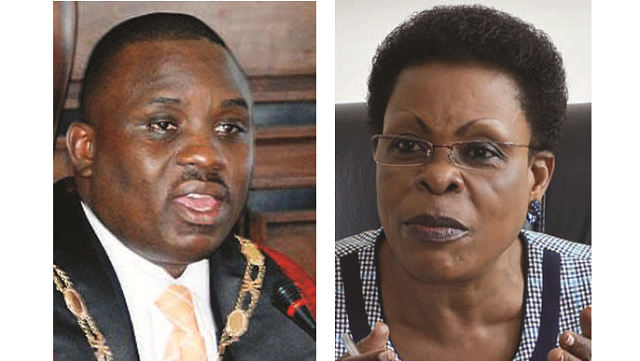
What do you want? Are you a customer? She asked as soon as we spoke to her. She had no time for interviews with journalists, she said.
“I have no time for that. I only want customers,” she said. We moved on.
Near to her stall were a line of other vendors conversing with no customers in sight.
“We hope customers will find us this side and will get used to the place,” said Muhammed Kasaga, the acting chairperson of venders in the new market. “The environment here is better compared to where we were. You can also see for yourself and judge.”
Kasaga says he has been vending at Park Yard for 23 years since 1994. He says he began as youth aged 17.
He says business in the new area has been slow for the entire week they had spent in the new area. In a bid to lure buyers to climb four floors, the vendors have hired a group of youth to advertise and show customers around the new area.
To evict the vendors, Hamis Kiggundu first secured the backing of President Yoweri Museveni in 2015 when he sold him the idea of redeveloping Nakivubo Stadium which has been a derelict ancient area, with water-logged unkempt grounds, poorly lit rooms, and cracking concrete pavilions.
Kiggundu convinced Museveni that he would convert the area into a modern shopping and sports complex. Kiggundu plans involve constructing a 25,000-seater sports arena, a 930-vehicle parking area, 1,500 tiny shops, and a perimeter wall around the stadium.
It is not clear why President Museveni backed the young entrepreneur. Although Kiggundu became well known recently when he constructed a large shopping block near Makerere University, he is not known for doing any major construction projects at the level of national stadium. According to stadium.com, a 30, 000-seater stadium such as those used in the recent 2017 African Cup of Nations in Gabon could cost anything between US$100 million and US$250 million.
Recently when Kiggundu unveiled his palatial home on the edge of Lake Victoria with 25 rooms, it was said to have cost him about that much or Shs600 billion – a clear exaggeration since renowned Uganda tycoon Sudhir Ruperelia who until recently was named by Forbes as the richest man in East Africa with US$900 million in assets built an equally grand mansion for Shs6 billion.
Kiggundu’s youth, bravado, and lack of clear source of wealth have sparked a frenzy of speculation that he could be a front for people with wealth but shy to show it publicly – including the First Family. In an interview, with the Daily Monitor newspaper, Kiggundu dismissed the label of a front and it is not uncommon for tycoon to pop up, literally out of nowhere, in Uganda.
It is equally not uncommon for grandiose projects to be launched in Uganda, including by President Museveni, only to end up as empty shells. Ugandans point at many projects which were vaunted around the 2007 CHOGM in Kampala, including Arab princes, but have never taken off. In one case, a school was shifted for a would-be 7-star hotel and in another a church was shifted and ministry building demolished.
In this case, Hamis Kiggundu is said to be working hand in glove with the Board of Trustees of Nakivubo War Memorial Stadium, who are his “landlord”. He reportedly won the tender to redevelop the Park Yard into a modern sports facility beating several other companies. But there are numerous court cases blocking his venture. For now, he appears determined to ride roughshod over them, with government backing.
 The Independent Uganda: You get the Truth we Pay the Price
The Independent Uganda: You get the Truth we Pay the Price



Any business that hurts other people (human being), is immoral. More so if the business is capitalized/built thru fraudulent means.